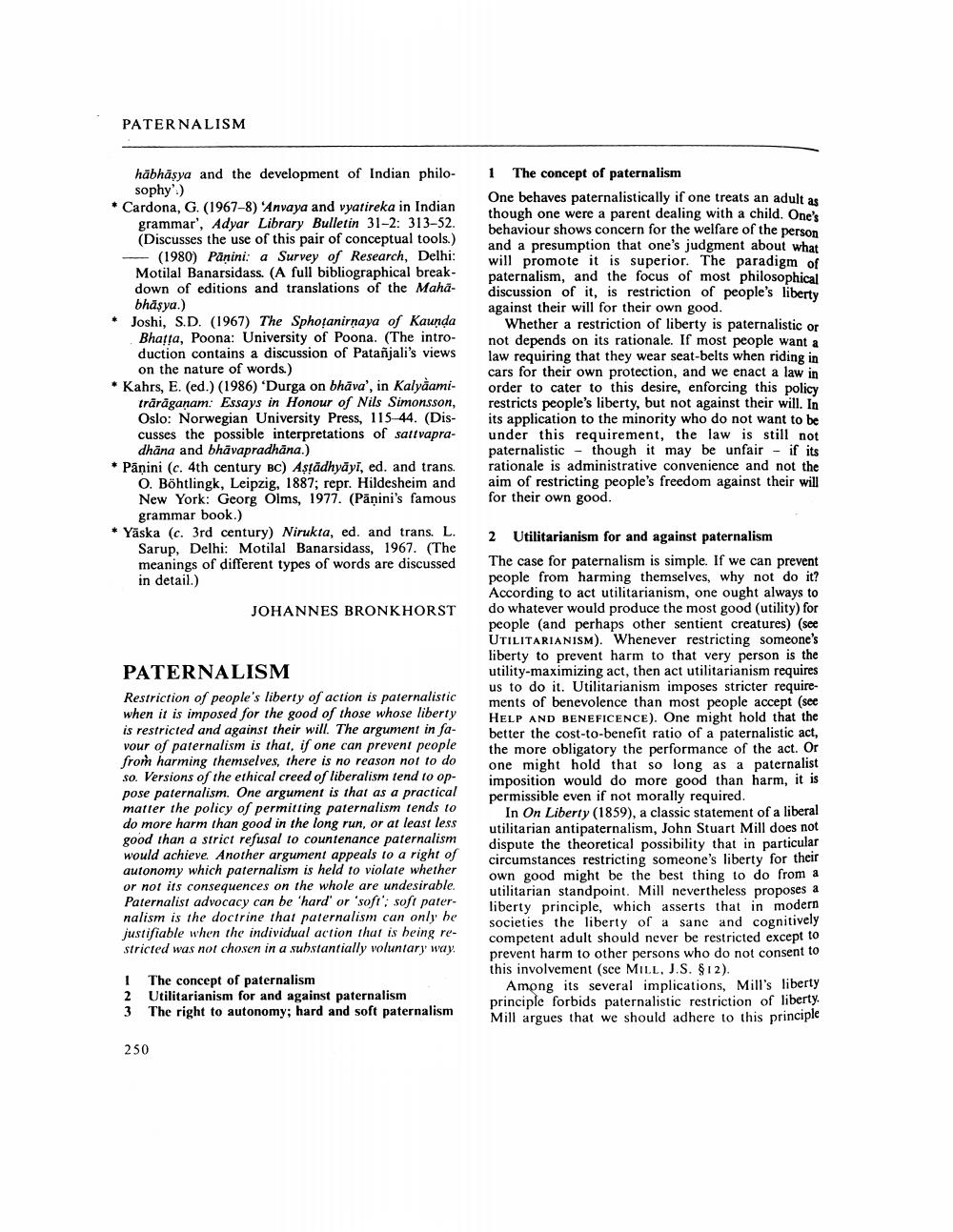Book Title: Patanjali Author(s): Johannes Bronkhorst Publisher: Johannes Bronkhorst View full book textPage 3
________________ PATERNALISM habhasya and the development of Indian philo- sophy':) * Cardona, G. (1967-8) 'Anvaya and vyatireka in Indian grammar', Adyar Library Bulletin 31-2: 313-52. (Discusses the use of this pair of conceptual tools.) - (1980) Panini: a Survey of Research, Delhi: Motilal Banarsidass. (A full bibliographical breakdown of editions and translations of the Mahabhasya.) Joshi, S.D. (1967) The Sphotanirnaya of Kaunda Bhatta, Poona: University of Poona. (The introduction contains a discussion of Patanjali's views on the nature of words.) * Kahrs, E. (ed.) (1986) 'Durga on bhava', in Kalyaami traraganam: Essays in Honour of Nils Simonsson, Oslo: Norwegian University Press, 115-44. (Discusses the possible interpretations of sattvapra dhana and bhavapradhana.) * Panini (c. 4th century BC) Astadhyayi, ed. and trans. 0. Bohtlingk, Leipzig, 1887; repr. Hildesheim and New York: Georg Olms, 1977. (Panini's famous grammar book.) * Yaska (c. 3rd century) Nirukta, ed. and trans. L. Sarup, Delhi: Motilal Banarsidass, 1967. (The meanings of different types of words are discussed in detail.) 1 The concept of paternalism One behaves paternalistically if one treats an adult as though one were a parent dealing with a child. One's behaviour shows concern for the welfare of the person and a presumption that one's judgment about what will promote it is superior. The paradigm of paternalism, and the focus of most philosophical discussion of it, is restriction of people's liberty against their will for their own good. Whether a restriction of liberty is paternalistic or not depends on its rationale. If most people want a law requiring that they wear seat belts when riding in cars for their own protection, and we enact a law in order to cater to this desire, enforcing this policy restricts people's liberty, but not against their will. In its application to the minority who do not want to be under this requirement, the law is still not paternalistic - though it may be unfair - if its rationale is administrative convenience and not the aim of restricting people's freedom against their will for their own good. JOHANNES BRONKHORST PATERNALISM Restriction of people's liberty of action is paternalistic when it is imposed for the good of those whose liberty is restricted and against their will. The argument in favour of paternalism is that, if one can prevent people fron harming themselves, there is no reason not to do so. Versions of the ethical creed of liberalism tend to oppose paternalism. One argument is that as a practical matter the policy of permitting paternalism tends to do more harm than good in the long run, or at least less good than a strict refusal to countenance paternalism would achieve. Another argument appeals to a right of autonomy which paternalism is held to violate whether or not its consequences on the whole are undesirable. Paternalist advocacy can be 'hard' or 'soft'; soft paternalism is the doctrine that paternalism can only be justifiable when the individual action that is being restricted was not chosen in a substantially voluntary way. 2 Utilitarianism for and against paternalism The case for paternalism is simple. If we can prevent people from harming themselves, why not do it? According to act utilitarianism, one ought always to do whatever would produce the most good (utility) for people and perhaps other sentient creatures) (see UTILITARIANISM). Whenever restricting someone's liberty to prevent harm to that very person is the utility-maximizing act, then act utilitarianism requires us to do it. Utilitarianism imposes stricter requirements of benevolence than most people accept (see HELP AND BENEFICENCE). One might hold that the better the cost-to-benefit ratio of a paternalistic act, the more obligatory the performance of the act. Or one might hold that so long as a paternalist imposition would do more good than harm, it is permissible even if not morally required. In On Liberty (1859), a classic statement of a liberal utilitarian antipaternalism, John Stuart Mill does not dispute the theoretical possibility that in particular circumstances restricting someone's liberty for their own good might be the best thing to do from a utilitarian standpoint. Mill nevertheless proposes a liberty principle, which asserts that in modern societies the liberty of a sane and cognitively competent adult should never be restricted except to prevent harm to other persons who do not consent to this involvement (see Mill, J.S. SS 12). Among its several implications, Mill's liberty principle forbids paternalistic restriction of liberty. Mill argues that we should adhere to this principle 1 2 3 The concept of paternalism Utilitarianism for and against paternalism The right to autonomy; hard and soft paternalism 250Page Navigation
1 2 3
